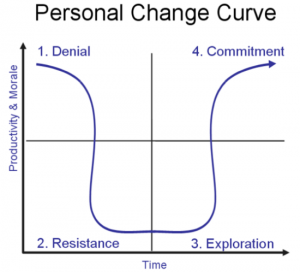Whether it be a grad scheme, internship, or a ‘regular’ job, for many graduates stepping onto the career ladder the main goal is getting there (wherever there may be for you). But what happens after you’ve arrived and settled? How will you react when your priorities change? And how will you cope when the ‘new’ becomes… well, the norm! You might not have all the answers right now, but keep these questions in mind to help you recognise the warning signs if the going gets a little tough.
You will undoubtedly experience a range of emotions as you grapple with a hard truth - the university bubble has well and truly burst and leaving ‘studenthood’ is quite daunting. But this is not a bad thing - it’s just different from what you’ve grown accustomed to in your formative years. So instead of falling flat, why not put a positive spin on it and instead think of it as your personal change curve.

The curve is your journey into the world of work. The peaks and troughs represent your expectations, your emotions and your growth at various developmental stages in a new role. Naturally, it begins on a high as you’re fresh faced and filled with anticipation but mind the expectation gap, or you may find yourself resisting the change if reality doesn’t quite meet your expectations. It happened to me and I managed to pull through, so believe me when I say you can get your mojo back!
On that note, here are my 4 top tips for your first year on the job:
1. Find a coach or mentor
I can’t recommend a coach or mentor enough, and from my experience with the Gradconsult team I’ve seen that you are never too junior or senior in your position to receive some additional support. Some organisations will provide you with one as standard, but if not, seek one out! Approach someone in your organisation (or externally) who you are comfortable talking to; someone who is knowledgeable, supportive but will equally challenge you in order to facilitate your development.
Your sessions are an opportunity to speak openly and honestly about how you are getting on, raise criticisms and to soundboard any ideas you may have. Try keeping a weekly log of everything you have done, noting down what went well and what could have done better. This will help to shape your sessions whilst encouraging you to regularly assess your own performance.
2.Get a healthy work-life balance
I hate to admit it but there is a lot to be said for the phrase work hard, play hard. Regardless of whether you decide to remain in your university city, move elsewhere, or head back to your hometown, a healthy work-life balance is vital to help you feel grounded wherever land. Having hobbies is a great way to meet people with mutual interests while doing something you enjoy, so if you wish to expand your social circle this could be a great place to start. At Gradconsult, our hobbies range from climbing to stunt cheerleading to DJing!
3.Take onus of your learning and development
For many graduates, the offer of training within a role is very appealing, especially after dedicating years to a subject area. I would strongly encourage taking an active approach to learning at work because it isn’t the sole responsibility of your employer to develop you. Don’t just wait to be assigned to a course or to be given materials. Instead, have a go at identifying areas for improvement and find materials to kick-start the refining process.
3 things I highly recommend:
- Reading books, journals, articles etc. (don’t know where to start? Ask your team for recommendations!)
- Attending training sessions (a large number are available via Eventbrite)
- Asking questions (your colleagues will have a wealth of knowledge!)
4. Go the extra mile
Your job spec is only an outline of what you’ll be doing, so don’t limit yourself by adopting a ‘that’s not in my remit’ attitude – GET INVOLVED! If you have a solution, speak up. If you have an idea, share it. If you want in on a project, offer your input. Collaboration is vital for success, so if you don’t speak up you’ll risk stagnating your own growth and maybe even the progress of key projects.
So, there you have it. My 4 top tips for your first year on the job. I hope they are as useful to you as they have been for me. It’s been slightly over a year since I started and the greatest lesson I learned is what got you here won’t get you there. Development is an ongoing journey and to this day I’m still asking questions, still expanding my industry knowledge, and at times, I still find myself rolling down the change curve to resistance before making my way up to commitment.
An important thing to accept is that there will be bumps in the road, but understand that this is a normal part of the learning process. Whenever you are faced with the unfamiliar there will be an element of challenge, but don’t let that put you off – keep moving forward because tackling challenges will help you to develop both personally and professionally.
